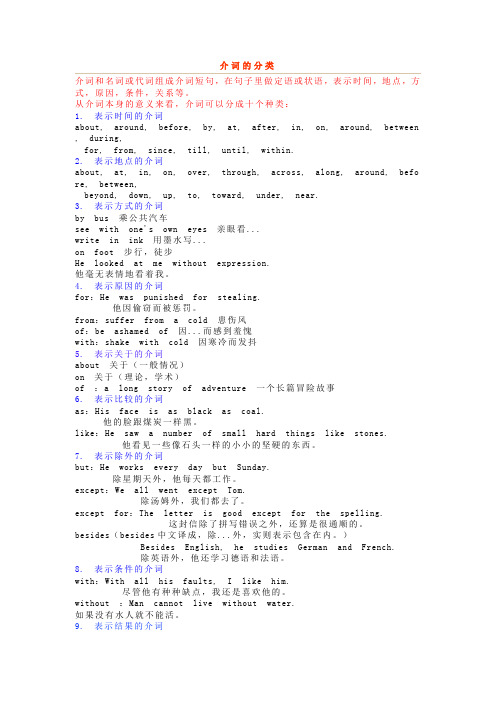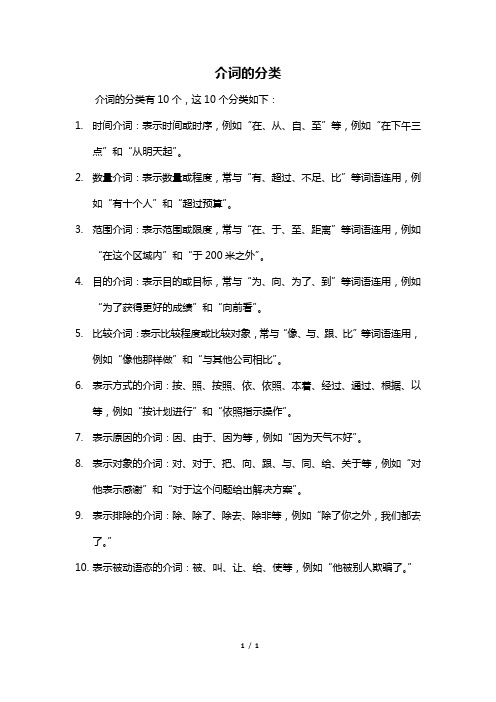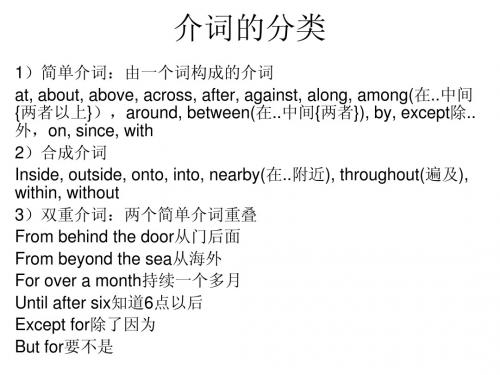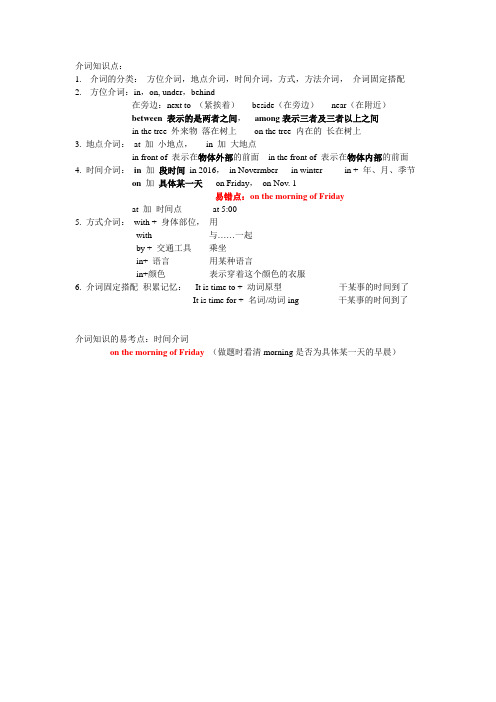介词的分类1
介词的分类

介词的分类介词和名词或代词组成介词短句,在句子里做定语或状语,表示时间,地点,方式,原因,条件,关系等。
从介词本身的意义来看,介词可以分成十个种类:1. 表示时间的介词about, around, before, by, at, after, in, on, around, between, during ,for, from, since, till, until, within.2. 表示地点的介词about, at, in, on, over, through, across, along, around, before, betw een,beyond, down, up, to, toward, under, near.3. 表示方式的介词by bus 乘公共汽车see with one's own eyes 亲眼看...write in ink 用墨水写...on foot 步行,徒步He looked at me without expression.他毫无表情地看着我。
4. 表示原因的介词for:He was punished for stealing.他因偷窃而被惩罚。
from:suffer from a cold 患伤风of:be ashamed of 因...而感到羞愧with:shake with cold 因寒冷而发抖5. 表示关于的介词about 关于(一般情况)on 关于(理论,学术)of :a long story of adventure 一个长篇冒险故事6. 表示比较的介词as:His face is as black as coal.他的脸跟煤炭一样黑。
like:He saw a number of small hard things like stones.他看见一些像石头一样的小小的坚硬的东西。
7. 表示除外的介词but:He works every day but Sunday.除星期天外,他每天都工作。
英语介词具体分类

英语介词具体分类英语中最常用的介词,按照不同的分类标准可分为以下几类:(1).简单介词、复合介词和短语介词①.简单介词是指单一介词.如:at ,in ,of ,by ,about ,for,from ,except ,since,near,with 等.②.复合介词是指由两个简单介词组成的介词.如:Inside,outside ,onto,into ,throughout,without ,as to as for ,unpon,except for 等.③.短语介词是指由短语构成的介词.如:In front of ,by means o f,on behalf of,in spite of ,by way of ,in favor of ,in regard to 等.(2).按词义分类{1} 表地点(包括动向)的介词.如:About ,above,across,after,along ,among,around ,at,before,behind,below,beneath,beside,between ,beyond ,by,down,from,in,into ,near,off,on,over,through,throught,to,towards,under,up,unpon,with,within ,without 等.{2} 表时间的介词.如:About,after,around ,as ,at,before ,behind ,between ,by,during,for,from,in,into,of,on,over,past,since,through,throughout,till(until) ,to,towards ,within 等.{3} 表除去的介词.如:beside ,but,except等.{4} 表比较的介词.如:As,like,above,over等.{5} 表反对的介词.如:againt ,with 等.{6} 表原因、目的的介词.如:for,with,from 等.{7} 表结果的介词.如:to,with ,without 等.{8} 表手段、方式的介词.如:by,in ,with 等.{9} 表所属的介词.如:of ,with 等.{10} 表条件的介词.如:on,without ,considering 等.{11} 表让步的介词.如:despite,in spite notwithstanding等.{12} 表关于的介词.如:About,concerning,regarding ,with regard to,as for ,as to {13} 表对于的介词.如:to,for over ,at ,with 等.{14} 表根据的介词.如:on,according to 等.{15} 表其他的介词.如:for(赞成),without(没有)等.。
介词的分类

介词的分类
介词的分类有10个,这10个分类如下:
1.时间介词:表示时间或时序,例如“在、从、自、至”等,例如“在下午三
点”和“从明天起”。
2.数量介词:表示数量或程度,常与“有、超过、不足、比”等词语连用,例
如“有十个人”和“超过预算”。
3.范围介词:表示范围或限度,常与“在、于、至、距离”等词语连用,例如
“在这个区域内”和“于200米之外”。
4.目的介词:表示目的或目标,常与“为、向、为了、到”等词语连用,例如
“为了获得更好的成绩”和“向前看”。
5.比较介词:表示比较程度或比较对象,常与“像、与、跟、比”等词语连用,
例如“像他那样做”和“与其他公司相比”。
6.表示方式的介词:按、照、按照、依、依照、本着、经过、通过、根据、以
等,例如“按计划进行”和“依照指示操作”。
7.表示原因的介词:因、由于、因为等,例如“因为天气不好”。
8.表示对象的介词:对、对于、把、向、跟、与、同、给、关于等,例如“对
他表示感谢”和“对于这个问题给出解决方案”。
9.表示排除的介词:除、除了、除去、除非等,例如“除了你之外,我们都去
了。
”
10.表示被动语态的介词:被、叫、让、给、使等,例如“他被别人欺骗了。
”
1/ 1。
11.介词的分类

5)beyond的用法 a)表示”比…晚,迟于” Ex. They arrived beyond 9 o’clock.他们过了9点才到。 Ex. Don’t stay out beyond midnight.不要到了午夜才回来。 Ex. He delayed the matter beyond the fixed time.他把那件事拖 过了规定的时间。 b)表示“在…的那边,在…以外” Ex. The small village is 20 miles beyond the town. 小村子在离 城20英里外的地方。 Ex. These students came from beyond the sea.这些学生来自海 外。 c)表示“超过,为…所不及,超出…的范围” Ex. This book is beyond me,这本书我看不懂。 Ex. He is living beyond his income.他的生活入不敷出。 Ex. Good health is beyond price.健康是无价的。
4)介词短语作介词的宾语 Ex. Don’t look at me from under the spectacles. 不要在眼镜下看我。 Ex. From under the table ran out a black and white cat.从桌子底下跑出来一只黑白相间的猫。 (there was a black and white cat running out from under the table) 5)从句作介词的宾语 Ex. Your success will largely depend on what you do and how you do it.你的成功很大程度 上取决于你做了什么及怎么做的。
介词的分类

介词的分类介词可分为三类:1. 简单介词由一个单词构成的介词。
如:about, after, but, for, from, below等。
2. 复合介词由两个或两个以上单词合成的介词,如:into, throughout,onto,within,without, nearby等。
3. 短语介词一个或两个简单介词和一个或几个其他词类组合成一个短语,相当于一个介词,叫做短语介词,这类介词的末尾总是一个简单介词。
如:according to, because of, out of, in front of, instead of, along with等。
二、介词短语及其用法(一)介词短语的构成介词短语是以介词为中心词的词组,其结构模式通常是“介词 + 补足成分”。
1. 介词 + 名词 + 介词in front of, in spite of, by means of, on account of, with regard to, in view of, in return for, in addition to, for the sake of, in accordance with(按照,根据,和……一致)等。
2. 形容词(或分词、副词、连词) + 介词because of, instead of, according to, ahead of, owing to, apart from,due to,opposite to等。
3. 连词 + 分词(或形容词) + 介词as compared with, as opposed to等。
(二)介词短语的用法介词短语作为一个成分在句中可用作定语、状语、表语、宾语补足语等。
1. 作定语介词短语作定语时,一般放在被修饰词的后面,作后置定语。
The book on the desk is very interesting. 书桌上的那本书很有趣。
China is a great country with a long history. 中国是一个具有悠久历史的国家。
英语介词

1.介词介词又叫前置词,一般放在名词的前面。
介词是一种虚词,一般不重读,不能在句中独立充当一个成分,它只是表示它后面的名词、代词或相当于名词的词、短语或从句与其它成分的关系。
1.1 介词的分类介词可按其结构分为:1. 简单介词:简单介词是由一个单词构成的介词。
分为普通介词(如:at,by,for,in,over,to,up 等),合成介词(如:as for,onto,into,within,without,out of 等),和分词介词(如:concluding,regarding,concerning 等)三种。
2. 二重介词:二重介词是由两个简单介词重叠使用构成的。
如:from among,since before,until after,except in 等。
3. 短语介词:介词是由两个或者两个以上的词所组成的短语构成的。
一般说来,这个短语的最后一个词是简单介词。
如:according to,because of,instead of,in front of,with reference to 等。
介词还可按其词义分为下列几种:1. 表示地点。
如:about,across,after,among,around,behind,below,beside,beyond,down,from,into,off,over,throughout,towards,up,within,without 等。
2. 表示时间。
如:about,after,around,as,at,before,behind,between,by,during,for,from,in,into,of,on,over,past,since,through,till(until),to,towards,within 等。
3. 表示除去。
如:besides,but,except 等。
4. 表示比较。
如:as,like,above,over 等。
介词知识点

介词知识点:
1.介词的分类:方位介词,地点介词,时间介词,方式,方法介词,介词固定搭配
2.方位介词:in,on, under,behind
在旁边:next to (紧挨着)beside(在旁边)near(在附近)
between 表示的是两者之间,among表示三者及三者以上之间
in the tree 外来物落在树上on the tree 内在的长在树上
3. 地点介词:at 加小地点,in 加大地点
in front of 表示在物体外部的前面in the front of 表示在物体内部的前面4. 时间介词:in加段时间in 2016,in Novermber in winter in + 年、月、季节
on加具体某一天on Friday,on Nov. 1
易错点:on the morning of Friday
at 加时间点at 5:00
5. 方式介词:with + 身体部位,用
with 与……一起
by + 交通工具乘坐
in+ 语言用某种语言
in+颜色表示穿着这个颜色的衣服
6. 介词固定搭配积累记忆:It is time to + 动词原型干某事的时间到了
It is time for + 名词/动词ing 干某事的时间到了
介词知识的易考点:时间介词
on the morning of Friday(做题时看清morning是否为具体某一天的早晨)。
所有介词的用法

所有介词的用法介词的定义和分类介词是一类用于连接名词、代词、动词或形容词与其他词语之间关系的词语。
它们在句子中起到连接、修饰和补充的作用。
介词种类众多,根据其不同的意义和用法,可以进行如下分类:1.地点介词:表示位置、方位关系的介词,例如:at、in、on、over等。
2.时间介词:表示时间关系的介词,例如:at、in、on、before、after等。
3.方式介词:表示方式、手段、条件等的介词,例如:by、with、through等。
4.目的介词:表示目的、结果关系的介词,例如:for、to、in order to等。
5.原因介词:表示原因关系的介词,例如:because of、due to等。
6.比较介词:表示比较关系的介词,例如:than、as等。
7.修饰介词:表示修饰、补充关系的介词,例如:of、with、without、about等。
地点介词的用法at1.表示在某个具体的地点或位置,例如:at home、at school、at the busstop等。
2.表示在某个特定事件或场合,例如:at the party、at the meeting等。
3.表示在某个空间范围内,例如:at the front、at the back等。
in1.表示在内部或边界之内,例如:in the house、in the room、in the car等。
2.表示在某个区域、城市、国家等,例如:in Beijing、in China等。
3.表示在某个特定时间段,例如:in the morning、in July等。
on1.表示在某个表面或平面上,例如:on the table、on the floor、on thewall等。
2.表示在某个日期或具体的时间点,例如:on Monday、on January 1st等。
3.表示在某个交通工具上,例如:on the bus、on the train等。
over1.表示在某个位置的上方,例如:over the bridge、over the sky等。
- 1、下载文档前请自行甄别文档内容的完整性,平台不提供额外的编辑、内容补充、找答案等附加服务。
- 2、"仅部分预览"的文档,不可在线预览部分如存在完整性等问题,可反馈申请退款(可完整预览的文档不适用该条件!)。
- 3、如文档侵犯您的权益,请联系客服反馈,我们会尽快为您处理(人工客服工作时间:9:00-18:30)。
介词的分类 1.介词不能单独作句子的成分,而是用来表示名词或代词等和句中其他词之间的关系,通常放在名词或代词之前,构成介词短语。
根据结构,介词主要分成四种:1)简单介词:about, across, after, against, among, around, at, before, behind, below, beside, but, by, down, during, for, from, in, of, on, over, near, round, since, to, under, up, with 2)合成介词:inside, into, outside, throughout, upon, without, within 3)短语介词:acco rding to, along with, apart from, because of, in front of, in spite of, instead of, owing to, up to, with reguard to4)分词介词:considering, reguarding, including, concerning2.从意思上考虑,介词可分为下面三类:1)引导时间短语的介词:at, on, in, during, before, after, over, from, following, by, till, u ntil, towards, for, throughout, upon, since, pending, all through, prior to2)2) 引导地点状语的介词:in, at, across, to, down, under, near, between, over, from, int o, through, onto, off, outside, out of, inside, within, beside, behind, below, among, beyond, against, around, before, up, ahead of, via, in front of, under, along, past, opposite, above, next to3)3) 引导其他短语的介词:by, with, about, except, like, of, according to, instead of, wit hout, in, due to, because of, along with, as for, in spite of, on account of owing to, on b ehalf of, against, apart from, for, failing, plus, including, in regard to, with regard to用适当的介词填空:st Saturday I was busy ______ my homework .2.My teacher was very angry ______ me because I was late ______ school again.3.Kathy prefers a hula hoop ______ a book.4.I will invite some friends ______ my eighteenth birthday party.5.How long has he worked ______ an inventor.6.My uncle arrived ______ the airport ______ the morning of May 3.7.I will always help my friends when they are ______ trouble.8.There is nothing ______ air ______ space.9.I won't be back ______ June.10.______ the age ______ twenty, he had written two books.11.Mary fell ______ her bike and hurt her right leg.12. He has been away ______ China ______ three years ago.13.When I was ______ school, I was ______ the school football team.14. I think he will be ______ two o'clock.15.The teacher was given some flowers ______ his students.16.Look, the birds are singing ______ the tree.17.He left the classroom ______ all the windows open.18.My sister is ill today. She doesn't feel ______ eating anything.19.It's too dangerous. You must keep the children away ______ the fire.20.My parents arrived ______ a cold night.21.You should apologize ______ her ______ stepping on her foot.22.The students are sitting ______ the table, reading the newspaper.23.The city is famous ______ its football, and people there are very proud ______ their city football team.24.We are doing better ______ English ______ our teacher's help.25.Don't worry ______ me. Everything is going well ______ me.26.He was late ______ school today, and she came late ______school, too.27.------ Do you know what happened ______ Peter yesterday?------ He was hit ______ a car.28.I like clothes made ______ cotton.29.He will go to Hangzhou ______ his car tomorrow.30.______ my surprise, the Englishman gave up halfway ______the end.Key: 1. with 2. with, for 3. to 4. to 5. At 6. at, in 7. in, 8. but, in 9. until 10.At, of 11. off 12. from, since 13. in, on/in 14. in 15. by 16. in 17. with 18. like 19. from 20. on 21. to, for 22. at 23. for, of 24. in, with 25. about, with 26. for, to 27. to, by 28. from 29. in 30. To, in例题1. ---What time did you get there this morning?--- _________ eight.A. InB. OnC. AtD. From2. He has got a chair to sit _______, but nobody to talk ________.A. on, toB. / , withC. on, /D. / , to3.Where's Lily? We are all here ________ her.A. besideB. aboutC. exceptD. with4.Shanghai lies ________ the east of China.A. toB. inC. onD. at1. C.2. A3. C.4. B.强化练习题 1. She heard a terrible noise, ______ brought her heart into her mouth.A. itB. whichC. thisD. that B2.The teacher gave the books to all the students except _______who had already tak en them. A. ones B. some C. the ones D. the others3.Our manager allowed _______to take a holiday next week.A. you and IB. yourself and meC.I and youD. you and me D4. Although he 's wealthy,he spends___ on clothes.A. littleB. fewC. a littleD. a few A5. They were all tired, but _____ of them would stop to take a rest.A. anyB. someC. noneD. neither C6. I don’t know whether small or anges are sweeter than big ______.A. thoseB. onesC. oneD. that B7. When they met, they stopped and said hello to_______.A. each otherB. each anotherC. the other each D .each one A8. After everyone took_______ place, the meeting began.A. hisB. theirC. thereD. the A9. -Why don’t we take a little break?-Didn’t we just have _______?A. itB. thatC. oneD. this C10. If you want to change for a double room you’ll have to pay ___$15.A. anotherB. otherC. moreD. each A11. We should always keep ______ well-informed of the changing information.A. usB. oursC. ourselvesD. we C12. Give the message to ______ is at the table.A. whomeverB. whoseverC. whateverD. whoever D13. I found _______impossible for _______to work out the maths problem.A. it; himB. it; heC. that; himD. that; he A14. Few pleasures can equal _____ of a cool drink on a hot day.A. someB. anyC. thatD. those C15. I hate ______ when people talk with their mouths full.A. itB. thatC. theseD. them A16. Mary learned Chinese for about two years, _______is, from 1993 to 1995.A. thisB. thatC. itD. he B17. She is doing her homework.I'll do_______.A. suchB. soC. the sameD. the same as B18. In some restaurants, food and service are worse than ______ used to be.A. theyB. itC. themD. that A19. Everyone who comes to the party is given a wooden apple with _____ ow n names cut in it as a souvenir.A. hisB. herC. theirD. our A20. Children can usually dress ______ by the age of five.A. himB. themC. himselfD. themselves D答案与解析(部分)1. B 在非限定性定语从句中指代前面的整个句子,应用which。
